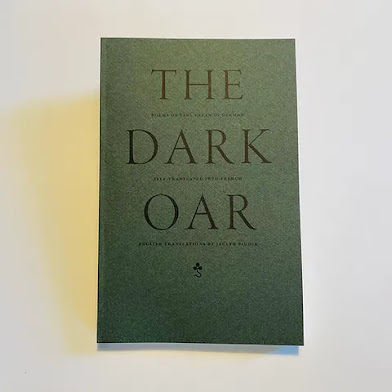Paul Celan, The Dark Oar, translated by Jaclyn Piudik
Paul Celan made Paris hishome from 1948 until his death in 1970, and while his day-to-day life wasconducted in French, he composed only one poem in his adopted language: “Ô leshâbleurs,” written for his son Eric in 1968. For Celan, a polyglot and prolifictranslator of the work of other writers – from Shakespeare to Apollinaire, Mandelstamto Char, to name but a few – there was no question that German, theMuttersprache or mother tongue, would be the language of his poems. despite hiscomplex stance vis-à-vis the German language, his native tongue itself was, accordingto his biographer, John Felstiner, “the only nation he could claim.” Yet Celanhad a long connection to French, having initiated his study of the language inhigh school in Czernowitz, later undertaking medical training in Tours between1938 and 1939, and maintaining epistolary exchanges with friends and colleagueswell before taking up residence in Paris. By the time Celan settled in France,he had already mastered the language, and his rapport with it would deepen,even though it would always be the language of his “exile.” (“FOREWORD”)
 Presentedas a poem in three languages is
The Dark Oar
(Toronto ON: Beautiful OutlawPress, 2024), offering an original poem by Romanian-French poet Paul Celan(1920-1970) composed in German, alongside his own translation of the poem intoFrench, and subsequently, the translation from French into English by Toronto poet and translator Jaclyn Piudik. As Piudik offers in her preface to the collection,she purposefully chose to translate the poems from the French, as opposed to translatingdirectly from the German: “The Dark Oar brings Celan’s French translationsof his own German poems – 26 in total – into English for the first time. Celan’stranslations span some 17 years, from 1952 to 1969, through many phases of hislife and his writing career.” She continues, writing: “And while there are manyfine translations of the original German poems into English, the translation ofCelan’s French versions of those poems open a window into the poet’s relationshipboth to his mother tongue and to his adopted language.” There is something I findfascinating about anyone moving to write in a language beyond their mothertongue. Samuel Beckett (1906-1979) and Milan Kundera (1929-2023), for example,who also moved into France and composed works in French, each of them situatedin their own unique and very different forms of exile.
Presentedas a poem in three languages is
The Dark Oar
(Toronto ON: Beautiful OutlawPress, 2024), offering an original poem by Romanian-French poet Paul Celan(1920-1970) composed in German, alongside his own translation of the poem intoFrench, and subsequently, the translation from French into English by Toronto poet and translator Jaclyn Piudik. As Piudik offers in her preface to the collection,she purposefully chose to translate the poems from the French, as opposed to translatingdirectly from the German: “The Dark Oar brings Celan’s French translationsof his own German poems – 26 in total – into English for the first time. Celan’stranslations span some 17 years, from 1952 to 1969, through many phases of hislife and his writing career.” She continues, writing: “And while there are manyfine translations of the original German poems into English, the translation ofCelan’s French versions of those poems open a window into the poet’s relationshipboth to his mother tongue and to his adopted language.” There is something I findfascinating about anyone moving to write in a language beyond their mothertongue. Samuel Beckett (1906-1979) and Milan Kundera (1929-2023), for example,who also moved into France and composed works in French, each of them situatedin their own unique and very different forms of exile.Itis interesting to see Beautiful Outlaw editor/publisher, the Toronto poet, translator and critic Mark Goldstein, expand his own explorations into Paul Celan throughpublishing such projects, following American poet Robert Kelly’s Earish(Beautiful Outlaw, 2022), a German-English “translation” of “Thirty Poems ofPaul Celan” [see my review of such here], as well as through multiple of hisown projects, including Thricelandium (Beautiful Outlaw Press, 2024)[see my review of such here], Tracelanguage: A Shared Breath (TorontoON: BookThug, 2010) [see my review of such here], Part Thief, Part Carpenter(Beautiful Outlaw, 2021), a book subtitled “SELECTED POETRY, ESSAYS, ANDINTERVIEWS ON APPROPRIATION AND TRANSLATION” [see my review of such here] and ascurator of the folio “Paul Celan/100” for periodicities: a journal of poetryand poetics, posted November 23, 2020 to mark the centenary of Celan’s birth.
ThroughPiudik’s offering, it allows for the possibility of seeing further into theprocess of Celan the translator alongside Celan the poet, catching thedifferences he might have himself seen in the shifts between language, and afurther project might be seeing just how different these English translationsmight be to others taken directly from Celan’s German. A book of companions andcomparisons, especially for those able to read German and French, as Piudikwrites:
Thus I stand, stony,
facing you.
High.
Eroded
by drifting sand, the two
hollows at the forehead’sedge.
Inside,
darkness glimpsed.
Pierced by the beats
of hammers brandishedmutely,
the place
where the winged eyebrushed me.
Behind,
in the wall,
the step where theRemembered crouches.
Facing here
animated by nights, avoice
streams,
from which you ladle thedrink.



